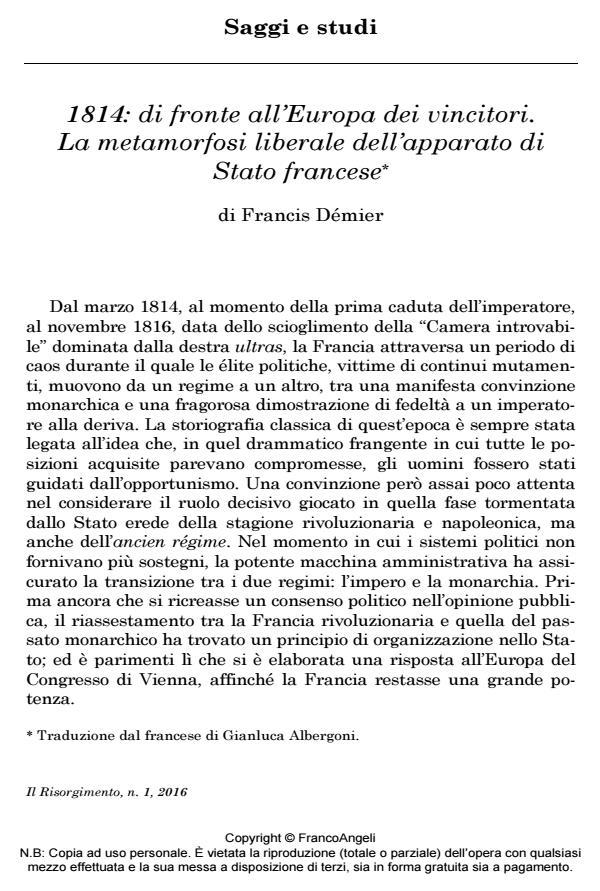1814: facing the conquerors’ Europe. The liberal metamorphosis of the French state structure
Journal title RISORGIMENTO (IL)
Author/s Francis Démier
Publishing Year 2016 Issue 2016/1 Language Italian
Pages 16 P. 5-20 File size 143 KB
DOI 10.3280/RISO2016-001001
DOI is like a bar code for intellectual property: to have more infomation
click here

FrancoAngeli is member of Publishers International Linking Association, Inc (PILA), a not-for-profit association which run the CrossRef service enabling links to and from online scholarly content.
In spite of the reactionary right wing’s ambitions, the Bourbon Restoration following the fall of Napoleon in 1814 was characterized by the need of establishing some continuity with the recent past by purging the most politically compromised governmental officials. This essay shows how a powerful administrative structure, having inherited a long tradition, was able to ensure a smooth transition from the imperial regime to the monarchic one, mostly through economic measures. The technocratic elite, acting during the Restoration early years, was familiar with the ideas of Turgot, Necker and even Colbert and was a passionate reader of the English laissez-faire literature. Besides, its administrative staff had gained experience during the previous years or even during the Ancien Regime. By drawing upon a strongly pragmatic liberalism the technocratic elite was therefore able to manage a delicate transition by assigning the State the task of modernizing the economy, a task which was unavoidable if France was to keep its role as a European power.
Keywords: Transition from empire to monarchy, liberalism, modernization, state structure
- Beugnot A.-A. (1852), Vie de Becquey, Paris, Firmin Didot.
- Beugnot J.-C. (1866), Mémoires du Comte Beugnot, ancien minister (1783-1815), t. II, Paris, Dentu.
- Blanc de Volx J. (1903), Etat commercial de la France au commencement du XIXe siècle ou du commerce français, de ses erreurs et des ameliorations dont il est susceptible, Paris, Teutel et Wurtz.
- Bruguiere M. (1969), La Première Restauration et son budget, Geneve,
- Droz. Id. (1992), Pour une renaissance de l’histoire financière, XVIIIe-XXe siècle, Paris, Comite pour l’histoire economique et financiere de la France.
- Cameron R. (1986), Was England Really Superior to France? Review Article, in “The Journal of Economic History”, n. 4, pp. 1031-1039. DOI: 10.1017/S002205070005070
- Chaline J.-P. (1983), Modèle ou rivale? L’Angleterre vue par les Rouennais du XIXe siècle, in “Etudes Normandes”, n. 1, pp. 53-59.
- Clinquart J. (1979), L’administration des douanes sous le Consulat et l’Empire, 1800-1815, Paris, Association pour l’histoire de l’administration des douanes.
- Mollien F.N. (1845), Mémoires d’un ancien ministre du Trésor public, 1780-1815, Paris, Fournier, 4 voll., vol. I (1a edizione 1837). Stearns P. (1965), British Industry Through the Eyes of French Industrialists (1820-1848), in “The Journal of Modern History”, n. 1, pp. 50-61 (anche all’indirizzo web http://www.jstor.org/stable/1874564).
- Id. (1981), L’administration des douanes en France sous la Restauration et la monarchie de Juillet, Neully, Association pour l’histoire de l’administration des douanes.
- d’Audiffret Ch. (1863), Système financier de la France, Paris, Paul Dupont, vol. III. (anche all’indirizzo web http://gallica.bnf.fr/ark:/12148/bpt6k22404b).
- d’Audiffret Ch. L. G. (1841), Souvenirs sur le baron Louis, Paris, Crapelet (ristampa, Paris, Hachette-Livre BNF, 2014).
- Demier F. (1992), Marché et nation dans la France de la Restauration, these d’etat sous la direction de Philippe Vigier, Universite de Paris X.
- Id. (2012), La France de la Restauration (1814-1830). L’impossible retour du passé, Paris, Gallimard.
- Dupuis Ch. (1919), Le ministère Talleyrand en 1814, Paris, Plon.
- Girard L. (1985), Les libéraux français, Paris, Aubier.
- Gouraud Ch. (1854), Histoire de la politique commerciale de la France, Paris, Durand.
- Guena Y. (1999), Le baron Louis 1755-1837, Paris, Perrin.
- Gury J. (1988), Etudes comparatives sur l’image de la Grande Bretagne et les influences britanniques en France spécialement entre 1760 et 1830, these Universite de Paris IV, decembre.
- Lefebvre G. (1977), La France sous le Directoire, Paris, Ed. Sociales.
- Levasseur E. (1912), Histoire du commerce, vol. I, Paris, A. Rousseau. Mémoires du Comte Beugnot, ancien ministre (1783-1815) (1866), tomo II, Paris, Dentu.
- Mémoires du prince de Talleyrand, publiés avec une préface et des notes par le duc de Broglie… (1891-1892), Paris, Calman Levy, 5 voll., vol. I.
Francis Démier, 1814: di fronte all’Europa dei vincitori. La metamorfosi liberale dell’apparato di Stato francese in "RISORGIMENTO (IL)" 1/2016, pp 5-20, DOI: 10.3280/RISO2016-001001